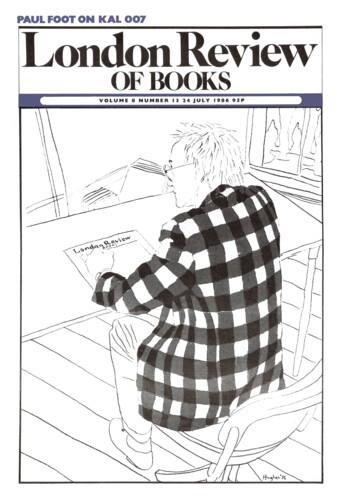Jeffrey Archer has taken to books as other men to property or publishing: as a way to get rich. As is well known, he wrote Not a Penny More, Not a Penny Less in order to escape the coils of bankruptcy and to pay his debts. That he should have done so triumphantly is a measure of his guts and application. But courage in adversity is one thing, literary merit quite another. His books are bad.
I hope that my opinion is not tainted by the taste of sour grapes. I have never risen to the post of Deputy Chairman of the Conservative Party, and am unlikely to, and I pay in income tax each year approximately one-eightieth of the amount received by a grateful Revenue from Archer Industries. I am envious, even admiring, but I can only explain the phenomenal success of his writing (Archer is thought to be worth ten million pounds) by pointing to the intellectual poverty of readers brought up in the age of the telly.
I am not being rude. Let me try and demonstrate what I mean. Until his latest book came my way I had resolutely refused to open a book of his. I had done so because I believed his success to be in inverse proportion to his literary merit. I was then seduced by my curiosity – only to find that A Matter of Honour is a one-dimensional exercise, a cardboard thriller without thrills, the plot of which is incredible. Who wants to read about the Tsar’s missing icon inside which is contained a secret which will give to its possessor power over the world. Oh God, give me Jilly Cooper.
Even so, I suspended my disbelief in the line of duty, and read all about it. After all, King Solomon’s Mines is about buried treasure in the heart of Africa, and Conan Doyle’s The Lost World about prehistoric monsters stranded over the millennia on an Amazonian plateau. Incredibility of itself need not prevent anyone from reading on. But more is required of such works than mere ingenuity: tales of derring-do are all the better for characterisation and descriptive writing – vide Treasure Island. Archer’s technique is founded upon simple dialogue spiced with surprise and the sudden shift of scene. The action moves forward through conversation. But his characters are unmemorable – even when they are real people like Brezhnev. No one who has read Rider Haggard can forget Alan Quarter-main, or Conan Doyle, Professor Challenger. Do Kane and Abel measure up to either of them? Or Adam Scott, the hero of his latest novel? They are men of straw.
As I struggled on, I searched my mind for a contemporary of Archer’s who has attempted a similar Cold War thriller. Although A Matter of Honour is filled with unpleasant people whose activities are often vile, it is entirely without menace. If my hair did stand on end, it was through boredom. Before he attempted to play Hamlet, le Carré was marvellously authentic: when it comes to spies and international skulduggery A Matter of Honour cannot hold a candle to The Spy. Nor does Archer share Fleming’s sense of style. Bond was a rotter, but an engaging one who would, as a young man, have been drummed out of the Hendon North Young Conservatives: Adam Scott would have been elected their chairman. Archer’s women are as cruelly treated as Bond’s, but at least Pussy Galore was pleasured.
I cannot remember anyone in the book saying anything of interest. There is a great deal of superfluous information designed to impress, but not a single character to whom one would want to give the time of day. A Matter of Honour, however, will bring a gleam to the eye of Heathrow Man and a song to the heart of the literary agent Debbie Owen. Jeffrey Archer has done more for the funds of the SDP than he will ever do for the Tory Party, or for literature.
Send Letters To:
The Editor
London Review of Books,
28 Little Russell Street
London, WC1A 2HN
letters@lrb.co.uk
Please include name, address, and a telephone number.

